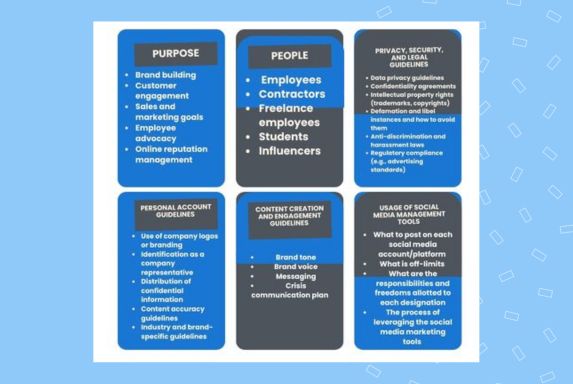Social media has become an integral part of our everyday lives, with people sharing their personal and professional experiences online. This trend benefits businesses. A recent Birdeye study reveals customers often show more loyalty to individual employees than the overall brand.
This is where a strong social media policy comes into play. It empowers your employees to post effectively while protecting your brand from unwanted attention.
A detailed social media policy helps businesses moderate how employees talk about their work, workplace, and brand values. This is critical for brands managing multiple locations and requiring employees to discuss the brand under a unifying guideline.
This blog post is your ultimate guide to effective social media policy and how to build one that works for your business.
Table of contents
- What is a social media policy?
- How does having a social media policy benefit a business?
- What should a social media policy cover? Key components you need
- Social media policy template
- How to implement a social media policy for your organization
- Social media policy: Guiding light to a strong social media presence
- Frequently asked questions on social media policy
- Grow your social media presence with Birdeye
What is a social media policy?
A social media policy is a set of guidelines that outlines how employees, consultants, and contractors (if necessary) can represent a brand on social media. It can cover brand image guidelines (logos, brand name, colors, tone of voice), content restrictions, best practices, etc.
Key points to include in a social media policy document: 1. Purpose and scope of the policy: What it means to help the employees and who is covered under it. 2. Expectations and prohibitions: The right practices that employees must follow and what things employees should avoid. 3. Consequences: The impact of breaching the policy for all employees.
How does having a social media policy benefit a business?

A well-crafted social media policy helps businesses protect their brand, manage their online reputation, comply with legal requirements, and improve customer engagement.
Let’s look deeper at the benefits of a social media employee policy.
- Brand protection: Social media policy helps maintain a consistent brand image and ensures that all company-related content follows the same patterns, language, and visual style.
- Reputation management: By controlling what goes on the social media platforms, you can ensure no wayward post damages your company’s online reputation. Employees speaking for your brand with a consistent tone also fosters a positive reputation among potential customers.
- Legal compliance: Social media policy ensures compliance with relevant laws and regulations, such as data privacy or copyright laws. With guidelines in place, you can ensure your employees don’t post sensitive or protected content online. This is especially important for businesses in the healthcare, legal, and other professional service industries.
- Build employee advocacy programs: A clear policy helps employees better advocate for your brand. They know what to say, how, and where to say it.
- Effective crisis management: A well-crafted policy teaches employees to handle negative feedback online without hampering the company’s image.
What should a social media policy cover? Key components you need
Now that we know the impact of a social media policy on your business, let’s explore what such a social media policy for a business typically specifies. Key components usually include:

Purpose
This is one of the most important sections of the company’s social media policy, as it outlines your intent. Within this section, you can cover the aim of the policy with regard to:
- Brand building
- Customer engagement
- Sales and marketing goals
- Employee advocacy
- Online reputation management
The purpose should clearly outline who the policy applies to and how it aims to help people improve their social media performance. By understanding the policy’s rationale, employees are more likely to follow the guidelines and avoid any potential mishaps.
Participants
This section specifies who the social media policy applies to. Usually, it includes employees, contractors, freelance employees, students, and influencers. This way, you can control the narrative surrounding your business across social media platforms.
For multi-location businesses, it’s essential to specify which locations and employees the policy applies to, ensuring clarity and avoiding confusion.
Privacy, security, and legal guidelines
The social media policy is not just to protect business interests and reputation. It is also a tool that helps your employees to adhere to the required privacy and security guidelines. These guidelines protect your customers’ interests and save your brand from any legal consequences.
Your social media policy should detail these privacy and security guidelines, including legal requirements, best practices, and the consequences of breaking them.
Additionally, you can mention any guidelines over and above the ones mandatory for your industry in the policy.
Things to include in this section: 1. Data privacy guidelines 2. Confidentiality agreements 3. Intellectual property rights (trademarks, copyrights) 4. Defamation and libel instances and how to avoid them 5. Anti-discrimination and harassment laws 6. Regulatory compliance (e.g., advertising standards)
Personal account guidelines
You can moderate how employees interact with the business account and, in some cases, how they use their personal accounts. Within the legalities of your work location, you can provide guidelines for employees/team members/contractors.
Some examples of personal account guidelines in social media policy include information surrounding:
- Use of company logos or branding
- Identification as a company representative
- Distribution of confidential information
- Content accuracy guidelines
- Industry and brand-specific guidelines
Content creation and engagement guidelines
This section of the company social media policy document outlines how your team can work with the brand online. This includes how they interact with your target audience, what they can post regarding your business, and how to handle negative comments/feedback online.
Information on brand tone, voice, messaging, and your crisis communication plan to equip your team to present a unified front online can also be helpful.
Usage of social media management tools
Large multi-location businesses often utilize social media management or other marketing tools to post on official accounts. Ensure your policy covers all your employees, including but not limited to social media managers, location managers, and marketing executives.
You can outline:
- What to post on each social media account/platform
- What is off-limits
- What are the responsibilities and freedoms allotted to each designation
- The process of leveraging the social media marketing tools
Social media policy template
Looking to build a comprehensive social media policy for your business and unsure where to start? We bring you four social media templates for inspiration. Treat these as the baselines and build as necessary for your business requirements.
You can also check a few social media policy examples from your peer industries for inspiration.
Template 1: General Social Media Policy
[Company Name]Social Media Policy
Purpose: This policy outlines the guidelines for using social media by [Company Name] employees. Its purpose is to protect the company’s reputation, maintain brand consistency, and ensure compliance with relevant laws and regulations.
Scope: This policy applies to all [Company Name] employees, regardless of their position or department. It covers the use of all social media platforms, including but not limited to:
- [List of social media platforms]
Expectations:
- Represent the company professionally: Employees must always represent [Company Name] positively and professionally.
- Adhere to brand guidelines: All content shared on social media must align with the company’s brand guidelines, including [list of brand guidelines].
- Respect intellectual property: Employees must respect the intellectual property rights of others and avoid sharing copyrighted or trademarked material without permission.
- Protect company confidential information: Employees must never share confidential company information on social media.
- Use appropriate language: Employees must use appropriate language and avoid using offensive or discriminatory language.
Prohibitions:
- Sharing personal opinions: Employees may not share personal opinions or beliefs that could be perceived as representing the company’s views.
- Engaging in inappropriate behavior: Employees may not engage in inappropriate behavior, such as harassment, bullying, or defamation.
- Sharing false or misleading information: Employees may not share false or misleading information.
- Using social media for personal gain: Employees may not use social media for personal gain, such as selling products or services that compete with the company.
Consequences: Violations of this policy may result in disciplinary action, including termination of employment.
Additional Guidelines:
- Crisis communication: Employees must follow the company’s crisis communication plan in a crisis.
- Data privacy: Employees must comply with all applicable data privacy laws, including [list of relevant laws].
- Reporting violations: Employees who witness or become aware of violations of this policy must report them to their supervisor or HR department.
[Company Name][Date]
Template 2: Employee-Focused Social Media Policy
[Company Name]Employee Social Media Policy
Purpose: This policy outlines the guidelines for employees’ use of social media. Its purpose is to protect the company’s reputation, maintain brand consistency, and ensure compliance with relevant laws and regulations.
Scope: This policy applies to all [Company Name] employees, regardless of their position or department.
Personal Account Guidelines:
- Use of company logos and branding: Employees may not use the company’s logo or branding on their personal social media accounts without written permission.
- Identification as a company representative: Employees should indicate whether they are speaking on behalf of the company or as an individual.
- Appropriate content and behavior: Employees must avoid sharing offensive, discriminatory, or harmful content.
Additional Guidelines:
- Confidentiality and privacy: Employees must protect the confidentiality of company information and the personal information of customers and colleagues.
- Data privacy: Employees must comply with all applicable data privacy laws, including [list of relevant laws].
[Company Name][Date]
Template 3: Customer-Focused Social Media Policy
[Company Name]Customer-Focused Social Media Policy
Purpose: This policy outlines the guidelines for the company’s use of social media to interact with customers. Its purpose is to provide excellent customer service, build customer relationships, and protect the company’s reputation.
Customer Service Guidelines:
- Response timeframes: The company will respond to customer inquiries and complaints within [timeframe].
- Professionalism: All interactions with customers on social media must be conducted professionally and courteously.
- Problem resolution: The company will strive to resolve customer issues promptly and effectively.
Additional Guidelines:
- Privacy and data protection: The company will protect the privacy of customer data and comply with all applicable data privacy laws.
- Negative feedback: The company will respond to negative feedback constructively and respectfully.
[Company Name][Date]
Template 4: Marketing-Focused Social Media Policy
[Company Name]Marketing-Focused Social Media Policy
Purpose: This policy outlines the guidelines for the company’s use of social media for marketing purposes. It aims to increase brand awareness, generate leads, and drive sales.
Content Calendar: The company will develop and maintain a social media calendar to ensure consistent and relevant content.
Key Performance Indicators (KPIs): The company will track and measure the performance of its social media activities using key performance indicators, such as [list of KPIs].
Advertising Guidelines: The company will follow all applicable advertising guidelines, including those set by social media platforms and industry regulators.
Partnerships and Collaborations: The company may partner with other businesses or influencers to promote its brand and reach a wider audience.
Additional Guidelines:
- Crisis communication: The company will have a crisis communication plan to address negative publicity or social media crises.
- Data privacy: The company will comply with all applicable privacy laws, including [list of relevant laws].
[Company Name][Date]
Manage multiple social media accounts from a unified dashboard
Want to see the impact of Birdeye on your business? Watch the Free Demo Now.
How to implement a social media policy for your organization
Drafting a social media policy is often only the first step in controlling your social media presence. Now, ensure that your organization can implement it successfully and empower employees to boost your value across social media.
Here is a list of steps that can help you implement a strong social media policy for your organization:
1. Develop from the template
The base template is only a starting point. For best results, your social media policy must be custom-made to your organization, industry, and employee set. Include legal guidelines, privacy regulations, and branding instructions that can help you develop stellar social media performance.
2. Involve all stakeholders
Next, involve all important stakeholders to ensure that all perspectives are covered. Some of the stakeholders to include are marketing directors, HR, department heads, legal representatives, and consultant liaisons, if any.
3. Communicate to employees and collect feedback, if necessary
Afterward, share the social media policy with your essential employee set (those who might have access to your social media accounts). This way, you can collect feedback on the guidelines before you launch it to the whole organization.
4. Launch
It is time for the big launch once you have considered all feedback and ensured a well-rounded social media policy. It is vital that your employees, contractors, and consultants are aware and willing to follow it to the tee.
Pro tip: While a big launch always works, we recommend following it up with monthly or bi-monthly reminders for the best results. You can also include it in the onboarding package for newer employees to avoid misses.
Social media policy: Guiding light to a strong social media presence
A well-crafted social media policy is essential for businesses to thrive in today’s digital age. Clear guidelines for employee conduct safeguard your brand’s reputation, ensure legal compliance, and foster a positive online presence.
Customize your policy to your industry and business requirements and communicate it effectively to your employees. The policy is only fruitful if all the stakeholders are on board and willing to abide by it to boost your social media presence.
Frequently asked questions on social media policy
Not having a social media policy can harm your business reputation, open you up to legal issues, and prevent employees from clearly understanding how to promote your business on social media.
The three R’s of an effective social media policy are representation, responsibility, and respect. This policy allows your employees to represent your business in the right tone and boosts your brand visibility.
Social media policies are legal in most countries unless prohibited by labor laws or union regulations.
Grow your social media presence with Birdeye
A social media policy helps build an employee advocacy program, scale your impact on social media, and reach newer target audiences. It can work wonders in presenting a unified front online while also providing a guideline for employees to create and interact online.
However, managing multiple social media accounts can be challenging, especially for multi-location businesses. A comprehensive social media management tool ensures consistency and simplifies the juggling of multiple accounts without any hassle or errors.
Birdeye Social AI, an all-in-one AI-driven social media management tool, can help you integrate multiple social media accounts and post simultaneously from a centralized dashboard. With Birdeye Social AI, you can take control of your social media presence and leverage AI to ideate, create, and gather social insights across multiple platforms.
As a leading provider of customer experience solutions for multi-location businesses, we know what you need to excel in your business.
Watch a free demo to learn more.

Originally published









